Geometric & Grid Maze Puzzles
Maze puzzles are intricate and engaging challenges that involve navigating through a complex network of paths, dead ends, and corridors to reach a specific goal or exit point. These puzzles come in various paper based printable forms, ranging from square, hexagonal, round, triangle and more.
Recommended: Check out our Printable Puzzle Books Collection to download and print.
Also try these puzzle makers to make your own custom printable puzzles.
Need Help? To get started, check out these instructions, goals and rules for how to solve puzzles
Select a section to filter results:
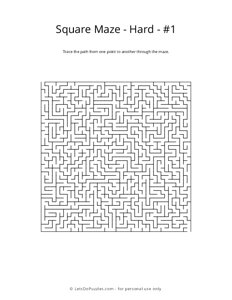 Square Maze - Hard - 1
Square Maze - Hard - 1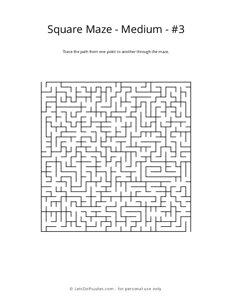 Square Maze - Medium - 3
Square Maze - Medium - 3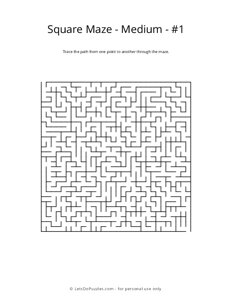 Square Maze - Medium - 1
Square Maze - Medium - 1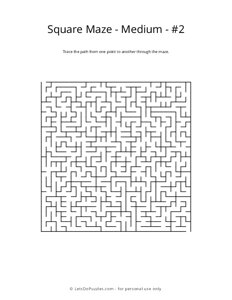 Square Maze - Medium - 2
Square Maze - Medium - 2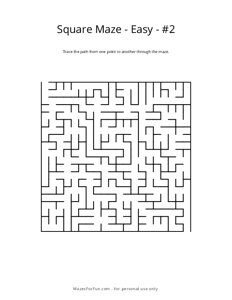 Square Maze - Easy - 2
Square Maze - Easy - 2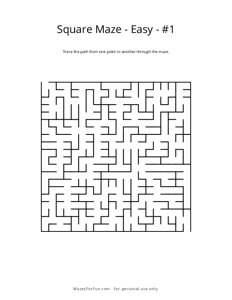 Square Maze - Easy - 1
Square Maze - Easy - 1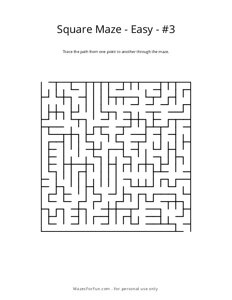 Square Maze - Easy - 3
Square Maze - Easy - 3
Types of Mazes:
- Classical Mazes: These are the traditional mazes where the goal is to navigate from the starting point to the exit.
- Puzzle Mazes: They often incorporate additional challenges or objectives beyond simple navigation, such as collecting items or solving riddles to progress.
- Logic Mazes: These mazes require strategic thinking and logical deduction to find the correct path.
- 3D Mazes: These mazes add complexity by introducing height or depth, challenging participants to navigate through multi-dimensional pathways.
Features of Mazes:
- Dead Ends: Paths that lead to nowhere, requiring the solver to backtrack and find an alternative route.
- Branches and Choices: Mazes often present multiple paths or intersections, requiring decisions to be made about which direction to take.
- Obstacles: Some mazes incorporate obstacles like walls, gates, or locked doors that must be navigated around or overcome.
Benefits of Solving Mazes:
- Cognitive Skills: Mazes help improve problem-solving abilities, critical thinking, spatial awareness, and decision-making skills.
- Patience and Persistence: They teach perseverance and patience as solvers work through trial and error.
- Entertainment and Relaxation: Mazes can be a fun and entertaining way to pass the time and relax the mind.
Creation and Variations:
- Mazes can be created manually or generated by computer algorithms.
- There are various styles and themes for mazes, including geometric patterns, landscapes, or themed mazes based on popular movies, books, or games.
Applications:
- Besides entertainment, mazes are used in educational settings to develop problem-solving skills in children and adults.
- They're also utilized in psychological studies to understand decision-making processes and problem-solving strategies.
Overall, maze puzzles offer a stimulating challenge that engages the mind and provides entertainment while also fostering important cognitive skills.
